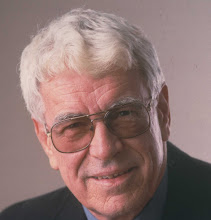August 31, 2008
“The Mayor of Halifax has very little actual power,” explained the Mayor of Halifax. “But he can use his office to bring people together, he can speak out on issues that matter, and he can lead by example.”
The year was 1968, exactly 40 years ago. The Mayor's name was Allan O'Brien, and my profile of him was my first national magazine article, in the long-vanished Star Weekly. I quote O'Brien from memory, but I know the substance is correct, because I subsequently came to know him quite well. He was a splendid representative of Halifax, a deep-rooted Nova Scotian with a global vision and a powerful view of his city's role in the world. He was a national vice-president of the NDP, a dedicated advocate for social justice and a vigorous opponent of the Vietnam war. Was it appropriate for the Mayor of Halifax to speak out on such matters?
“We're all very concerned about our own local issues, as we should be,” he said. “But I don't regard that as an excuse for ignoring the plight of our neighbours – anywhere in the world.”
O'Brien sprang to mind recently when I read a speech by Brian Flemming to the fledgling organization called Citizens for Halifax (www.citizensforhalifax.ca). I don't believe that the old City of Halifax was ever again led by a politician of O'Brien's stature – and Flemming's analysis of municipal politics today suggests that its clumsy successor never will be either.
As Flemming makes clear, Halifax Regional Municipality – let's be blunt – is a disaster. I liked John Savage and I honour his memory, but his amalgamation of numerous smaller municipal units to form HRM and CBRM was a breathtakingly dumb idea. As Flemming notes, Nova Scotia politics is dominated by rural Nova Scotia, which is deeply suspicious of the capital. By including all of Halifax County in HRM, Savage ensured that the same dysfunction now exists within HRM itself – and compounded the problems by instituting an unwieldy 23-member council of which only four members are from the genuinely urban peninsula of Halifax, and none are elected at large.
The result is a city council in which the city has no voice. Decisions about pivotal urban issues are taken by rural councillors obsessed, says Flemming, with “potholes in Ecum Secum or Hubbards.” Among the great achievements of this camel of a council is the passage, after endless hours of debate, of an unenforceable cat-control by-law to set alongside the unenforceable dog-control by-law.
This is scandalous. Small though it is, Halifax is a world city. Its history is about cataclysmic conflicts, the clash of empires, international trade, culture and communication. Halifax is leafy and hard-edged, salty and intimate, bustling with students and artists and movers and shakers, small enough to be convenient, large enough to provide a genuine urban lifestyle. Its leadership needs to combine local pride with global vision, treasuring the city's heritage while embracing its future as a model of sustainability and innovation.
Instead, it's obsessed with cat control.
Flemming offers no prescriptions for structural changes in HRM, but it's obvious that we need somehow to separate the truly urban districts ringing Halifax Harbour from the outer reaches of what was once Halifax County. HRM is a shotgun marriage that serves neither population well. In the meantime, Flemming has some useful suggestions to make about one of the major issues affecting the city, namely transportation.
Flemming chaired the Canada Transportation Act Review Panel of 2001, and he contends that core of the transportation system is still the road network. He suggests numerous useful improvements in road transportation – a tiered, closed-in highway along the railway cutting into the South End, a third Halifax Harbour crossing (possibly a tunnel), a bridge across the Northwest Arm, possibly the relocation of the two container piers to the Shearwater lands in Dartmouth.
His most important suggestion is the creation of an HRM Transportation Authority to plan and co-ordinate transportation in the municipality. The Authority would be governed by an independent board of directors, including representatives from such heavy users of the roads as truckers and commuters. Flemming would also give the Authority the power to support viable alternatives to roads, including fast ferries from Bedford and Purcell's Cove, light commuter rail service to Bedford and Sackville, bike paths and busses.
Such an Authority would benefit every part of HRM. The province would have to create it, but it's hard to imagine why any provincial politician would oppose it. Even more important, it might be a first step in liberating the capital from the paralysis that now grips it, a vivid example of the foresight and vision that a great little city so desperately needs.
Citizens for Halifax, this would be a great place to start.
-- 30 --
Sunday, September 7, 2008
The Liberation of Halifax
Subscribe to:
Post Comments (Atom)

No comments:
Post a Comment